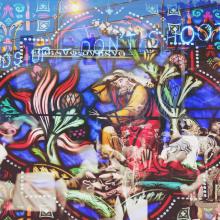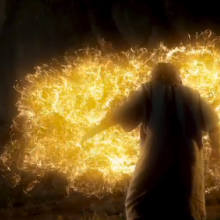Burning Bush
Take off your shoes.
No, I really mean it. Right now. Stop what you’re doing. Put down your phone, turn away from your computer screen. Loosen your laces, step out of your sandals, and free your feet from wherever they are currently confined.
Shoes off? Ok, now keep reading.
Take off your shoes, for you are standing on holy ground.
"Then the LORD said, 'I have observed the misery of my people…I have heard their cry…Indeed, I know their sufferings…’ - Exodus 3:7
For the last few weeks, the eyes of America have been riveted on the town of Ferguson, Missouri, a formerly little-known suburb of St. Louis. It was there on Aug. 9 that an unarmed African-American teenager named Mike Brown was shot six times by police, sparking ongoing protests and demonstrations by grief-stricken and outraged citizens. Clashes between demonstrators and heavily armed local police, highway patrol, and the Missouri National Guard have been the subject of extensive coverage and all manner of commentary across broadcast and social media.
These demonstrations in Ferguson represent something more than just lament for the tragic death of Mike Brown. They are an outcry at the demonization of black men, racial profiling, institutional racism, intergenerational poverty, the militarization of law enforcement, and a culture of incarceration in America. Over the last three weeks, Ferguson has become a flash point for urgent issues facing minority communities, issues which have been largely unnoticed or ignored by the majority white culture. The #Ferguson hashtag no longer just refers to the events happening in Ferguson but has come to represent a national conversation about the toll that institutional racism and its many diabolical expressions have taken on our fellow Americans.
In the days following Mike Brown’s death, columnist Leonard Pitts, Jr. described the protests as “an act of outcry, a scream of inchoate rage. That’s what happened this week in Ferguson, Mo. The people screamed.” These screams echo of the cries that God heard from the Hebrews enslaved in ancient Egypt.
The Bible. Just the phrase sends messages, signals, and feelings to our hearts and minds, and around the world. It’s the best-selling book in human history, and one that the majority of humanity (including me), believes to have been inspired by God, with myriad interpretations of what that means.
I grew up on Bible stories, some of the best stories in human and divine history. We learned them as kids, were amazed at the images and lessons, and they were ingrained into our thinking and acting. So I watched with great delight as my sons, Luke and Jack, saw the first episode of “The Bible,” a History Channel special series that began this past Sunday and runs the five weeks through Easter. Film and television personalities Mark Burnett and Roma Downey are behind this, with a legion of others. They expect it to eventually be seen by 1 billion people.
The first Sunday show was a very dramatic depiction of the creation story, Noah’s Ark, Abraham’s call to come out to a new land, the birth of Ishmael and Isaac, the almost sacrifice of Isaac, Hebrew slavery in Egypt, Moses' call at the burning bush, and the Exodus through the Red Sea — all in two hours! I loved watching my 9-year-old Jack watch the stories with such excitement. “I know this story!” he would say and tell us what was about to happen. “I don’t know this one,” he would then comment, and we would discuss it. We had a conversation about the scary sacrifice of Isaac before bedtime, trying to figure that one out. I told him I couldn’t have been as obedient as Abraham was.


